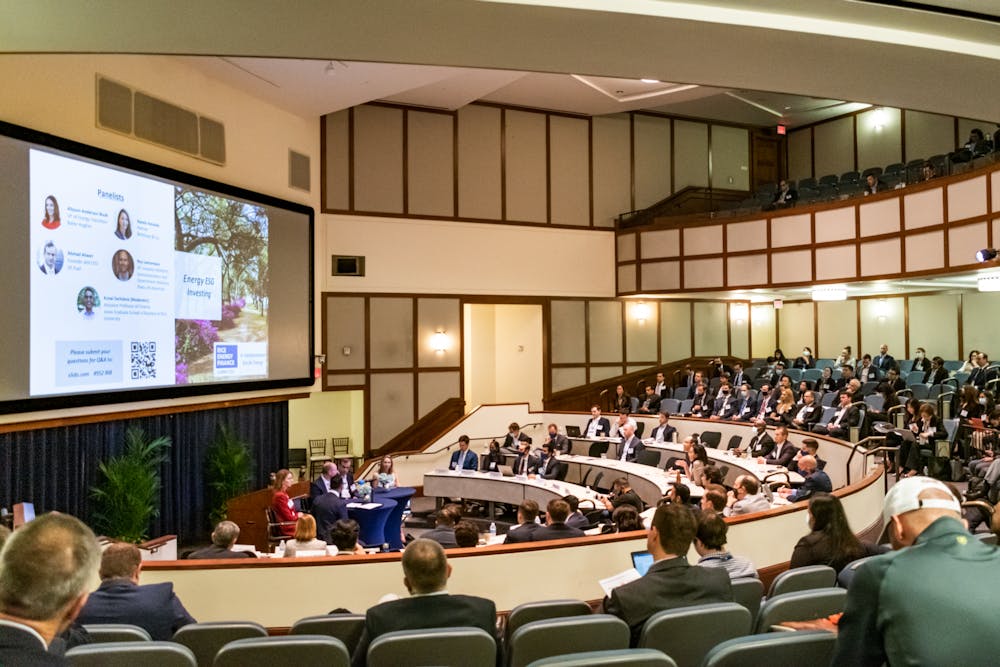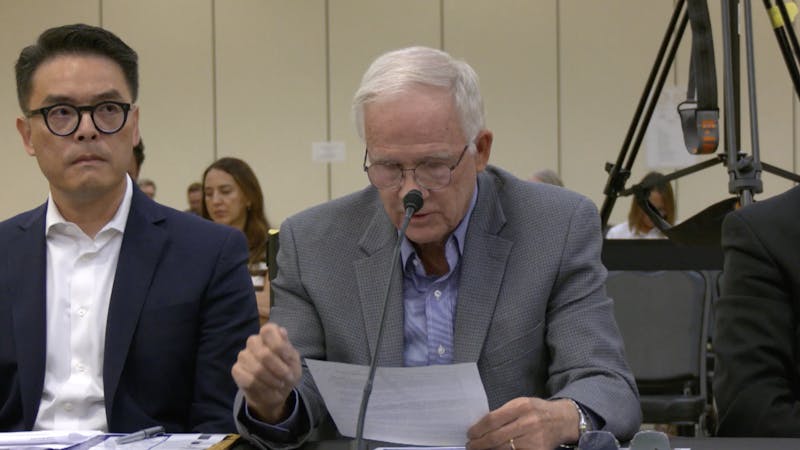REFS held on Nov. 12 to discuss financing energy transition

Shiyu Miao / Thresher
The 13th annual Rice Energy and Finance Summit was held at McNair Hall in the Jones Graduate School of Business on Friday, Nov. 12. The goal of the event was to discuss how to finance the transition to renewable energy resources, according to the school’s website and event information.
L.A. Martz, one of the organizers for the event, said that energy and finance have always been a focus in the business school.
“We’re a very strong business school in terms of finance, and a lot of people, because we’re in Houston, come from energy or want to go into energy,” Martz said. “It’s pretty important because essentially there’s a lot of ideas around energy, and how are you actually going to fund some of these ideas?”
Martz said that the event has evolved over the 13 years since it started, with the recent COP26 event lining up well with it.
“[We are in] a transformative era for energy,” Martz said. “It’s become a lot more all-encompassing of all sources of energy, not just oil and gas, which is important.”
The event, which ran from 8 a.m. to 6 p.m., began with a talk from keynote speaker Bobby Tudor, a Rice alum and member of the Board of Advisors for the Baker Institute for Public Policy, and the eponym for Tudor Fieldhouse.
“The whole topic of how to finance the energy transition is a really, really important one right now,” Tudor said. “It’s a part of the energy transition conversation that is not really happening much or not nearly to the degree that it needs to happen if we’re ultimately to make progress here and find solutions in a timely way. I think the REFS [creating a] sort of forum for that is really good.”
Tudor, who also serves as chairman of Tudor, Pickering, Holt & Co., spoke about how Houston as a city could finance their transition to increasing the number of jobs in the renewable energy industry.
“So much of the talent and understanding and knowledge of our global energy system sit in Houston already, and the transition by necessity will continue to involve the incumbent oil and gas business to a very high degree,” Tudor said. “There’s a lot of promise and hope around hydrogen as a substitute fuel for both transportation and power.”
According to Tudor, 60 percent of the nation’s hydrogen pipelines are in the Greater Houston area.
“This is why Houston both can and should be really central to the energy transition,” Tudor said.
Besides Tudor’s talk, the event also featured five panels of speakers from various important companies and organizations in the energy industry and private equity, such as Chevron and Goldman Sachs.
Robert Ragland, a Sid Richardson College junior who attended the event, said it was beneficial to learn about the amount of capital needed to meet 2050 emission goals.
“[The summit] was an incredible opportunity to hear how the CFOs of major oil and gas companies approached issues such as [Environmental, Social and Governance] demands from shareholders, returning cash flow to investors and maintaining credit ratings,” Ragland said.
Martz said that she hopes the event, which was virtual last year, will continue to grow in future years and bring the conversation of energy finance to the forefront.
“I think that with, hopefully, the respect that we garnered this year from the conference, and how seriously we take it as a student-led conference, it’s able to build on that,” Martz said. “I think everyone’s very comfortable talking about how it’s going to impact climate change and tie in everything that they’ve learned.”
Ragland said he attended the virtual summit last year, which he said was a completely different experience as there was almost no interaction with panelists and questions could only be asked in the Zoom chat.
“The highlight of the event [this year] was the networking session at the end, where I had the opportunity to meet industry professionals and hear their perspectives on panel topics,” Ragland said. “I was able to ask questions and develop a more comprehensive understanding of the energy industry while building personal connections.”
More from The Rice Thresher

Rice announces Chao College as 12th residential college
Rice announced that the 12th residential college will be named Ting Tsung and Wei Fong Chao College Aug. 19. The college, set to open in fall 2026, will contain nearly 300 on-campus beds.
Dining access fund announced following on-campus unlimited meal swipes
Rice announced new food assistance programs on Tuesday to account for the controversial change in the on-campus meal swipe plan.

Rice disaster prediction model discussed at hearing on deadly Central Texas floods
The House and Senate Select Committees on Disaster Preparedness and Flooding held a hearing on July 31 in Kerrville to address the deadly July 4 flooding in Central Texas. The flooding along the banks of the Guadalupe River killed 108 people, including 37 children. In the charged hearing, Texas lawmakers and flood survivors criticized the local response to the disaster.


Please note All comments are eligible for publication by The Rice Thresher.